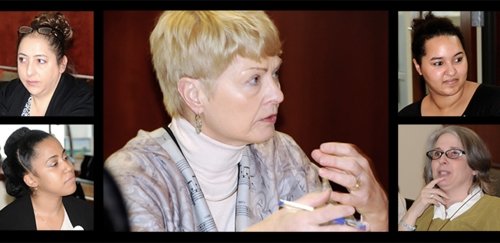
RIC Professor of History Joanne Schneider facilitated a post-March-on-Washington forum attended by RIC women, faculty and students, with guest speaker Craig O'Connor from Planned Parenthood.
On Jan. 21, 2017, more than 500,000 people mobilized to join the Women’s March on Washington and about 7,000 took part in the Rhode Island Women’s Solidarity Rally at the R.I. State House.
On Feb. 15 RIC participants regrouped to reflect on their experiences and to discuss ways to move forward. The forum was facilitated by RIC Professor of History Joanne Schneider, drawing women faculty and students from across the RIC community.
The energy at the march was electric, said Assistant Professor of Educational Studies Whitney Blankenship: “From the time we hit the airport, people everywhere were wearing pink hats. It was surprising to see such a big crowd. If you stepped on someone’s toes it was not big deal. To witness that many people expressing themselves with the same feelings I have, I thought to myself, ‘Okay, I’m not alone.’’’
“I met people from Maine to Michigan to New Jersey on the subway,” added RIC Adjunct Faculty of History Michelle Valletta. “[I listened to] their stories about what had brought them there, their concerns and issues, [and it] resonated with me. It was really powerful, so much so that I went home and wrote about it.’’
It was the immediacy and physicality of the march that impacted Valletta most, and she urged the young women gathered at the forum to physically meet with co-allies. “You can’t get this type of feeling through social media,’’ she said.
The discussion then turned to ways in which women can continue the momentum building for women’s rights. “Aside from marching, I think it’s important to figure out what we can do to create a legacy and where we can realize legislative or social change,’’ Schneider said.
Focusing on women’s reproductive rights, guest speaker Craig O’Connor, director of public policy and government relations for Planned Parenthood of Southern New England, expressed his concern that Planned Parenthood agencies could be defunded by the federal government.
“We provide basic preventative and primary healthcare to 2.5 million people nationally and about 60,000 patients in Southern New England.’’ This is one of many issues women addressed at the march and rally.
Stephanie Taveras, a student staff member at RIC’s Women’s Center said she felt a great sense of community at the Rhode Island rally. “Moving forward, we need to have more rallies that continue this feeling of unity at a time when many people are feeling like they’re separated.’’
Aisha Pierre, who recently transferred to RIC as a history major, was excited to learn about RIC’s Women’s Center. She said, “I will be stopping by to see what I can do and to talk about ways we can all stick together. We can’t lose this type of unity and togetherness.’’
